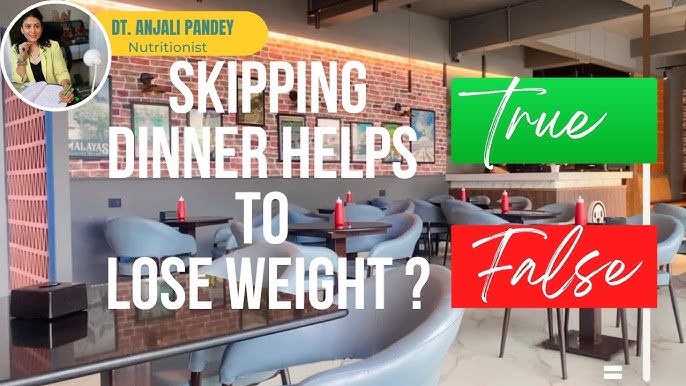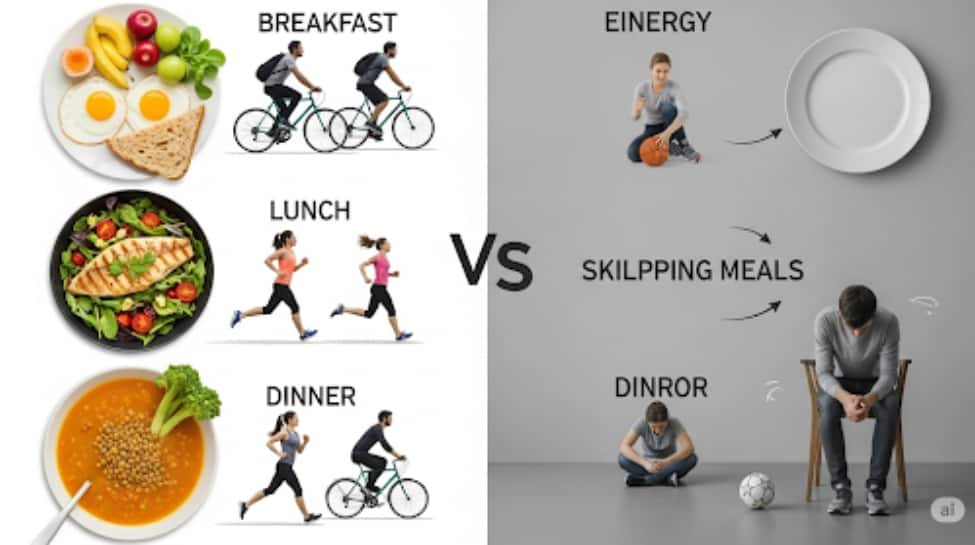Have you ever wondered if skipping dinner could be the secret to losing weight faster? You’re not alone.
Many people think cutting out their evening meal can help shed pounds quickly. But is it really that simple? Before you decide to skip your next dinner, it’s important to understand how this choice affects your body and your weight loss goals.
Keep reading to discover what really happens when you skip dinner—and whether it’s a smart move for you.

Skipping Dinner And Weight Loss
Many people wonder if skipping dinner can help them lose weight. Some believe eating less at night lowers calorie intake.
This idea sounds simple, but the effects on the body can be different for each person. It is important to understand how skipping dinner affects weight loss.
How Skipping Dinner Affects Calories
Skipping dinner reduces the total number of calories you eat in a day. Eating fewer calories than your body uses leads to weight loss.
People who skip dinner may eat more during other meals, which can cancel out the calorie reduction.
- Skipping dinner lowers daily calorie intake
- Eating more later can balance calories back
- Consistency matters for calorie control
Impact On Metabolism
Your metabolism controls how fast your body burns calories. Skipping dinner can slow your metabolism if it causes long fasting periods.
A slower metabolism means your body burns fewer calories, which may make losing weight harder over time.
- Skipping meals may slow metabolism
- Fasting too long can reduce calorie burning
- Balanced eating supports healthy metabolism
Short-term Vs Long-term Effects
In the short term, skipping dinner may cause quick weight loss due to fewer calories. This can motivate some people.
Long-term skipping of dinner might lead to nutrient shortages and slow metabolism. This can stop weight loss and harm health.
- Short-term: quick calorie drop and weight loss
- Long-term: possible nutrient gaps and metabolism slow down
- Healthy habits are better for lasting results
Benefits Of Skipping Dinner
Skipping dinner is a practice some people try to lose weight. It means not eating the last meal of the day. This can affect the body in several ways.
Here are some benefits of skipping dinner that might help with weight loss and health.
Calorie Reduction
Skipping dinner lowers the total calories you eat in a day. Eating fewer calories can lead to weight loss over time. This is because your body uses stored fat for energy.
Reducing calories without feeling hungry can be hard. Skipping dinner might make it easier to eat less overall.
Improved Insulin Sensitivity
Not eating late at night helps your body manage blood sugar better. Skipping dinner may improve insulin sensitivity. This means your body uses sugar more efficiently.
Better insulin sensitivity lowers the risk of type 2 diabetes. It also supports fat loss and overall health.
Potential For Intermittent Fasting
Skipping dinner can be a form of intermittent fasting. This means eating only during certain hours each day. Intermittent fasting helps reduce calorie intake and improve metabolism.
Many people find it easier to skip the evening meal than breakfast or lunch. This approach may support weight loss and better energy levels.
Risks Of Skipping Dinner
Many people think skipping dinner helps with weight loss. Skipping meals might reduce calories for some.
But skipping dinner can cause problems. It may harm your health and affect your body’s balance.
Nutrient Deficiencies
Skipping dinner means missing important nutrients. Your body needs vitamins, minerals, and protein daily.
Missing these can lead to tiredness and weak bones. It can also lower your immune system’s strength.
- Less vitamin intake can cause deficiencies
- Protein is needed for muscle repair
- Minerals help keep bones and teeth strong
- Skipping meals lowers overall nutrient intake
Impact On Energy Levels
When you skip dinner, your energy drops. Your body uses food for fuel, especially after a long day.
Low energy can make it hard to focus or exercise. You may feel weak or tired before bedtime.
- Skipping dinner reduces available energy
- Low energy affects mental and physical tasks
- May cause fatigue and dizziness
- Can disturb sleep quality
Possible Overeating Later
Skipping dinner can make you very hungry later. This hunger may lead to eating too much at night.
Overeating can add more calories than skipping saved. It may cause weight gain, not loss.
- Hunger grows after missing meals
- Leads to large, unhealthy snacks
- Overeating cancels calorie reduction
- Can increase cravings for sugary foods
Who Should Avoid Skipping Dinner
Skipping dinner is a common idea for losing weight. But it is not safe for everyone. Some people should eat dinner to stay healthy.
Understanding who should avoid skipping dinner can help keep your body strong and well-nourished.
People With Medical Conditions
People with health problems need steady energy. Skipping dinner can cause blood sugar to drop too low. This can make symptoms worse.
Conditions like diabetes or low blood pressure need regular meals. Skipping dinner may lead to dizziness or fainting.
- Diabetes requires balanced blood sugar levels
- Low blood pressure needs steady nutrition
- Heart conditions benefit from regular food intake
Athletes And Active Individuals
Active people burn many calories daily. Skipping dinner can reduce energy needed for recovery and performance.
Eating dinner helps muscles repair and grow. It also keeps stamina high for the next day’s activities.
- Supports muscle recovery
- Maintains energy for workouts
- Prevents fatigue and weakness
Those With Eating Disorders
People with eating disorders need careful meal plans. Skipping dinner can increase unhealthy thoughts about food.
Regular meals help build a healthy relationship with eating. Skipping dinner may worsen the disorder.
- Helps maintain balanced nutrition
- Supports mental health and stability
- Prevents triggering harmful behaviors
Alternatives To Skipping Dinner
Skipping dinner might seem like a quick way to lose weight. It can cause low energy and hunger later.
There are better ways to manage dinner for weight loss. These options help keep your body fueled.
Smaller, Balanced Meals
Eating smaller meals helps control calories without feeling too hungry. Make sure meals have proteins, fats, and carbs.
This balance keeps your body full and supports weight loss. Avoid large portions late at night.
- Include lean protein like chicken or beans
- Add healthy fats such as avocado or nuts
- Choose whole grains or vegetables for carbs
Early Dinner Timing
Eating dinner earlier can help your body digest food better. It may reduce late-night snacking.
Try to finish dinner at least two to three hours before bedtime. This gives your body time to rest.
- Eat dinner by 6 or 7 PM
- Plan meals around your sleep schedule
- Avoid heavy foods close to bedtime
Mindful Eating Practices
Pay attention to what and how you eat. Eating slowly helps you feel full sooner.
Avoid distractions like TV or phones during meals. This keeps you aware of hunger and fullness cues.
- Chew food slowly and enjoy each bite
- Stop eating when you feel satisfied, not stuffed
- Focus on the taste and texture of food

Tips For Effective Weight Loss
Skipping dinner might seem like an easy way to lose weight. Yet, healthy weight loss needs more than skipping meals.
Good habits help you lose weight safely. These tips focus on patterns, activity, hydration, and sleep.
Consistent Meal Patterns
Eating meals at regular times keeps your body balanced. It helps control hunger and prevents overeating later.
Try to eat three meals a day with healthy snacks if needed. Skipping meals can cause strong hunger and poor food choices.
- Set meal times and stick to them daily
- Include protein and fiber in each meal
- Avoid long gaps without food
Physical Activity
Exercise helps burn calories and build muscle. Muscle boosts metabolism, which aids weight loss.
Find activities you enjoy. Walking, biking, or dancing are good options to stay active.
- Aim for 30 minutes of activity most days
- Mix cardio and strength exercises
- Stay consistent to see results
Hydration And Sleep
Drinking enough water helps your body work well. Sometimes thirst feels like hunger, so water can stop overeating.
Good sleep supports weight loss. Lack of sleep can increase hunger and lower energy.
- Drink at least 8 cups of water daily
- Aim for 7-9 hours of sleep each night
- Create a calming bedtime routine

Frequently Asked Questions
Does Skipping Dinner Speed Up Weight Loss?
Skipping dinner can reduce calorie intake, potentially aiding weight loss. However, results vary based on individual metabolism and lifestyle. Balanced meals and portion control remain essential for sustainable weight management.
Can Skipping Dinner Affect Metabolism Negatively?
Regularly skipping dinner may slow metabolism by signaling the body to conserve energy. This can hinder weight loss efforts and cause fatigue. A consistent eating schedule supports a healthy metabolic rate.
Is Skipping Dinner Safe For Everyone?
Skipping dinner isn’t safe for everyone, especially children, pregnant women, and those with medical conditions. It may cause nutrient deficiencies or energy drops. Always consult a healthcare professional before making dietary changes.
How Does Skipping Dinner Influence Hunger Next Day?
Skipping dinner can increase hunger the following day, leading to overeating. This may negate calorie deficits and affect weight loss goals. Balanced meals help control appetite and maintain energy levels.
Conclusion
Skipping dinner might help some lose weight. But it’s not for everyone. Each body reacts differently to meal changes. Eating a balanced diet is crucial. Skipping meals can lead to overeating later. Listen to your body’s needs. Consider consulting a nutritionist for guidance.
Healthy habits often lead to lasting results. Weight loss is a personal journey. Small changes can make a big difference. Stay active and eat mindfully. Focus on what works best for you. Remember, health comes first. Make informed choices for your lifestyle.



